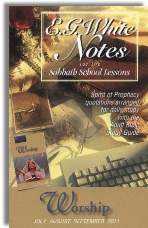|
||||||||||||||
Commentary on "Worship in Genesis: Two Classes of Worshipers"
Day 5: Wednesday, June 29, 2011 - The Faith of Abraham
Overview
In our study of what is true worship it is appropriate that we take time to examine the life and faith of Abraham. In Genesis chapter fifteen we see where God makes a covenant with him and then says in verse six; ‘Abram believed the Lord, and He credited it to him as righteousness’. This is a significant statement that is quoted in the book of Romans:
For what does the Scripture say? Abraham believed God, and it was credited to him for righteousness. (Romans 4:2-3 HCSB)
Another text on the faith of Abraham that we should consider is found in Hebrews:
By faith Abraham, when he was called, obeyed and went out to a place he was going to receive as an inheritance. He went out, not knowing where he was going. By faith he stayed as a foreigner in the land of promise, living in tents with Isaac and Jacob, coheirs of the same promise. For he was looking forward to the city that has foundations, whose architect and builder is God. (Heb 11:8-10 HCSB)
Observations
The lesson begins by making some inappropriate statements that have a tendency to side –track us from the main subject. The first is where it is mentioned that Abraham was a descendant of Seth. We are all descended through Noah from Seth which means, ultimately, all mankind is related and distant cousin to each other. So, why bother to make a point of saying that he was of the line of Seth?
Then, it says that “no doubt he and Sarah influenced many to accept the worship of the true God”. Since the scriptures say nothing in this regard, this is pure speculation.
It is poor grammar or simply wrong to imply that we “accept the worship of the true God” because it is God who accepts our worship when we come to him in ‘the faith of Able’, not the other way around.
By ignoring the book of Romans where the Apostle Paul delves in the subject of true faith, especially chapter four where Abraham’s faith is considered, the lesson fails to present a true understanding of the faith of Abraham.
1. BELIEVED GOD AND JUSTIFIED WITHOUT WORKS
What then can we say that Abraham, our physical ancestor, has found? If Abraham was justified by works, he has something to brag about—but not before God. For what does the Scripture say? Abraham believed God, and it was credited to him for righteousness. (Romans 4:1-3 HCSB)
Right from the first verses of this chapter it is made clear that Abraham was never justified by any work he did or was expected to do. God credited to him righteousness because he believed God. He was simply an ordinary sinner with extraordinary faith in what God told him.
2. CREDITED RIGHTEOUS APART FROM WORKS OF THE LAW
Romans 4:13-14 specifically states that the promise given to Abraham was apart from keeping the law, clearly meaning the Mosaic Law given over 400 years after the promise was given was not a part of this covenant.
The quarterly lesson implies that Abraham’s greatest moment of faith was expressed when he obeyed God and prepared to sacrifice Isaac. But, this is not in accord with biblical teaching.
This is why the promise is by faith, so that it may be according to grace, to guarantee it to all the descendants —not only to those who are of the law but also to those who are of Abraham’s faith. He is the father of us all in God’s sight. As it is written: I have made you the father of many nations. He believed in God, who gives life to the dead and calls things into existence that do not exist. He believed, hoping against hope, so that he became the father of many nations according to what had been spoken: So will your descendants be. He considered his own body to be already dead (since he was about 100 years old) and also considered the deadness of Sarah’s womb, without weakening in the faith. He did not waver in unbelief at God’s promise but was strengthened in his faith and gave glory to God, because he was fully convinced that what He had promised He was also able to perform. Therefore, it was credited to him for righteousness. (Romans 4:16-22 HCSB)
As viewed from a human perspective, when Abram and Sarai both laughed at what God told them would not have been when we would think their faith was at its greatest. Scripture reveals to us that God reads the heart of a person from a much different perspective from us and knew Abraham’s faith had not wavered. The proof comes from scripture. This is moment when God changed their names from Abram and Sarai to Abraham and Sarah along with the introduction of the sign of circumcision that would seal his covenant with Abraham.
God said to Abraham, “As for your wife Sarai, do not call her Sarai, for Sarah will be her name. I will bless her; indeed, I will give you a son by her. I will bless her, and she will produce nations; kings of peoples will come from her.” Abraham fell facedown. Then he laughed and said to himself, “Can a child be born to a hundred-year-old man? Can Sarah, a ninety-year-old woman, give birth?” So Abraham said to God, “If only Ishmael were acceptable to You!” (Gen 17:15-18 HCSB)
3. ABRAHAM’S FAITH CENTERED ON GOD ALONE
When you study Romans chapter four you will be referred back to this Genesis account where we have just been reminded that both Abraham and Sarah laughed when the God repeated his promise to them. But, and this is critical to understand, at no time in his life did Abraham ever display anything even remotely close to having a perfect character. Both Abraham and Sarah clearly understood that there was not even a remote chance that either of them could contribute anything to help God keep his promise.
4. ABRAHAM’S TOTAL TRUST IN GOD
Then Abraham took his son Ishmael and all the slaves born in his house or purchased with his money—every male among the members of Abraham’s household—and he circumcised the flesh of their foreskin on that very day, just as God had said to him. Abraham was 99 years old when the flesh of his foreskin was circumcised, and his son Ishmael was 13 years old when the flesh of his foreskin was circumcised. On that same day Abraham and his son Ishmael were circumcised. And all the men of his household—both slaves born in his house and those purchased with money from a foreigner—were circumcised with him. (Gen 17:23-27 HCSB)
Understand that Abraham’s faith is cited in scripture as being at its highest point when he realized there was not the slightest chance he could ‘help’ God do what only God could do. His instant willingness to obey God and prepare to sacrifice Isaac was a result of his total dependence and faith in God before Isaac’s conception and birth. Of course, it certainly does point to the true sacrifice of God’s only Son, Jesus Christ.
Then Isaac spoke to his father Abraham and said, “My father.” And he replied, “Here I am, my son.” Isaac said, “The fire and the wood are here, but where is the lamb for the burnt offering?” Abraham answered, “God Himself will provide the lamb for the burnt offering, my son.” Then the two of them walked on together. (Gen 22:7-8 HCSB)
Summary
- Romans chapter four directs our attention to when Abraham and Sarah laugh at God when he said they would have a son as the moment of Abraham’s greatest display of faith in the promise of God. Scriptural proof is that God changes their names to Abraham and Sarah and introduces the seal of circumcision as the sign of his covenant with Abraham at this time.
- All through the life of Abraham we see repeated failures of Abraham do anything resembling a perfect character.
- From God’s perspective, Abraham’s greatest faith was displayed when Abraham knew he was a total failure to do anything to assist God in the performance of what only what God could do.
- While Abraham’s instant unwavering willingness to obey God and sacrifice Isaac his only son has profound meaning that points to the true sacrifice of Jesus Christ God’s only Son, scripture does not cite this event as Abraham’s greatest moment of faith.
- While all believers are commanded and encouraged to grow in sanctification, it is a non-biblical myth that we must become perfect before God will accept us into his kingdom. Like Abraham, our righteousness and the Seal of our salvation has been credited to us by the sacrificial blood of Jesus Christ.
Copyright 2011 BibleStudiesForAdventists.com. All rights reserved. Revised June 26, 2011. This website is published by Life Assurance Ministries, Glendale, Arizona, USA, the publisher of Proclamation! Magazine. Contact email: BibleStudiesForAdventists@gmail.com.
The Sabbath School Bible Study Guide and the corresponding E.G. White Notes are published by Pacific Press Publishing Association, which is owned and operated by the Seventh-day Adventist church. The current quarter's editions are pictured above.
Official Adventist Resources
Standard Edition Study Guide Week 1
Teacher's Edition Study Guide Week 1
Easy Reading Edition Study Guide Wk 1
Search the Complete Published Ellen G. White Writings
Please Support This Project


